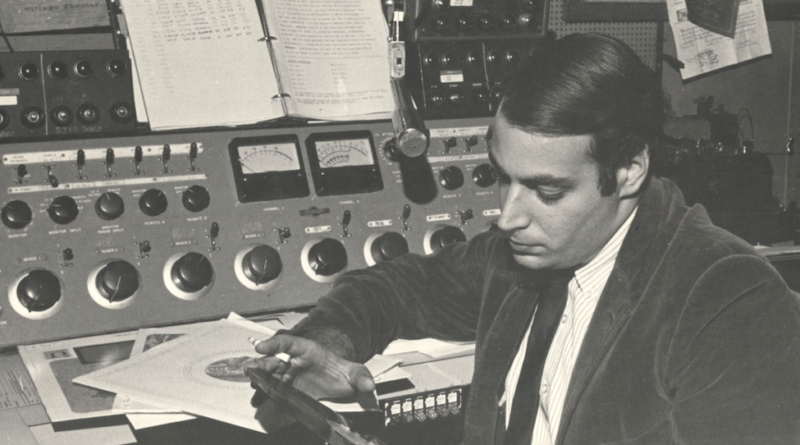INTERVIEW: New documentary looks back at radio giant Steve Post
Photo: Playing in the FM Band: The Steve Post Story takes a look at the career of the legendary radio personality. Photo courtesy of artist / Provided by Film Forum press site with permission.
Steve Post, the legendary radio host at New York City’s WBAI and WNYC, is the subject of a new documentary from producer and director Rosemarie Reed. The acclaimed film, called Playing in the FM Band: The Steve Post Story, is currently running at the Film Forum, and its one-week engagement has been extended for another week, with showings through March 24.
For Reed, the documentary was a chance for her to tell the story of this iconic radio host, who actually crossed paths with her back during their shared WBAI days. “I knew Steve Post,” Reed said in a recent phone interview. “He gave me my first job in radio, and I was talking to another person about five years ago, a woman named Caryl Ratner, who worked at the station as well. We were just sitting down talking, and I said to her, ‘Steve Post gave me my first job in radio.’ She said, ‘Well, isn’t that funny, he gave me my first job.’ And she said, ‘You know, someday maybe we should think about doing a film on his life.’ And that’s how it began.”
Reed and Ratner, who serves as executive producer of the new film, worked at WBAI, but they weren’t colleagues of Post’s for that long. This was the time when Post was gearing up for a move from WBAI to WNYC. In both places, he became associated with engaging, entertaining conversations that ran the gamut from Watergate to Vietnam War to the cultural changes outside in New York City. He is known for perfecting the freeform radio style, which means no script and many topics and guests who seemingly came out of the blue.
“I came into the station about a year before he left the station [WBAI], but I always remember that he was always in his office, always trying to shy away from people,” she said. “And he would emerge and talk with people and be friendly, but he liked to be alone. But I also remember that he was a very kind person. He had a gruff exterior at times, though I never experienced it, but he was really a person with a great heart and loved, loved radio. He never wanted to work in any other medium. He always loved radio.”
When Post went on the air, according to Reed’s research into the man and his many hours of archives, he became more animated and more alive. She said that on-air radio was where he wanted to be, and he had so many stories to tell.
“When he was off the air, he was more shy,” the director said. “He was more of an introvert off the air, but when he was on the air, you couldn’t stop him. … I’m a New Yorker. I’ve lived out of the country, out of the city many times, but I love New York. And I think what he did was bring New York into the studio, whether it was a good story, a bad story, a funny story, a sad story, an angry story. He made sure that New York really made it into his stories on a daily basis and also his stories about his own life. He shared. I think it’s a very generous thing to do to share your life with others, warts and all. If you’re asking me, did he become more alive on the air, did he become more animated, he certainly did because that’s where he belonged.”
Reed described the medium of radio as extremely intimate. In fact, in her estimation, the airwaves are more intimate than any other medium, including television and film. Listeners sit in their cars or at home, and all they have to do — all they can do — is listen.
“So the medium itself creates intimacy, and then you have somebody like Steve Post who furthers that intimacy,” Reed said. “And it came across that way to people. People really did try to connect to him and become a part of his show.”
Over the years, Post had many high-profile guests, including Abbie Hoffman, Paul Krassner (publisher of The Realist), Marshall Efron, Marilyn Sokol and John Lithgow, according to press notes. However, he also relished the chance to talk with “real” people who were far from the spotlight.
“It’s no coincidence, I believe, that Steve named his program The Outside because that’s how he felt,” she said. “He developed relationships with people and then brought them [on] if he thought they could contribute in some way to his program.”
Reed added: “So, the intimacy went from the radio itself as a medium that’s intimate to the person, and not everybody has that gift. They have other gifts for radio, but they don’t have that gift. And Steve had it.”
By John Soltes / Publisher / John@HollywoodSoapbox.com
Playing in the FM Band: The Steve Post Story, produced and directed by Rosemarie Reed, is currently playing at New York City’s Film Forum. Click here for more information and tickets.

